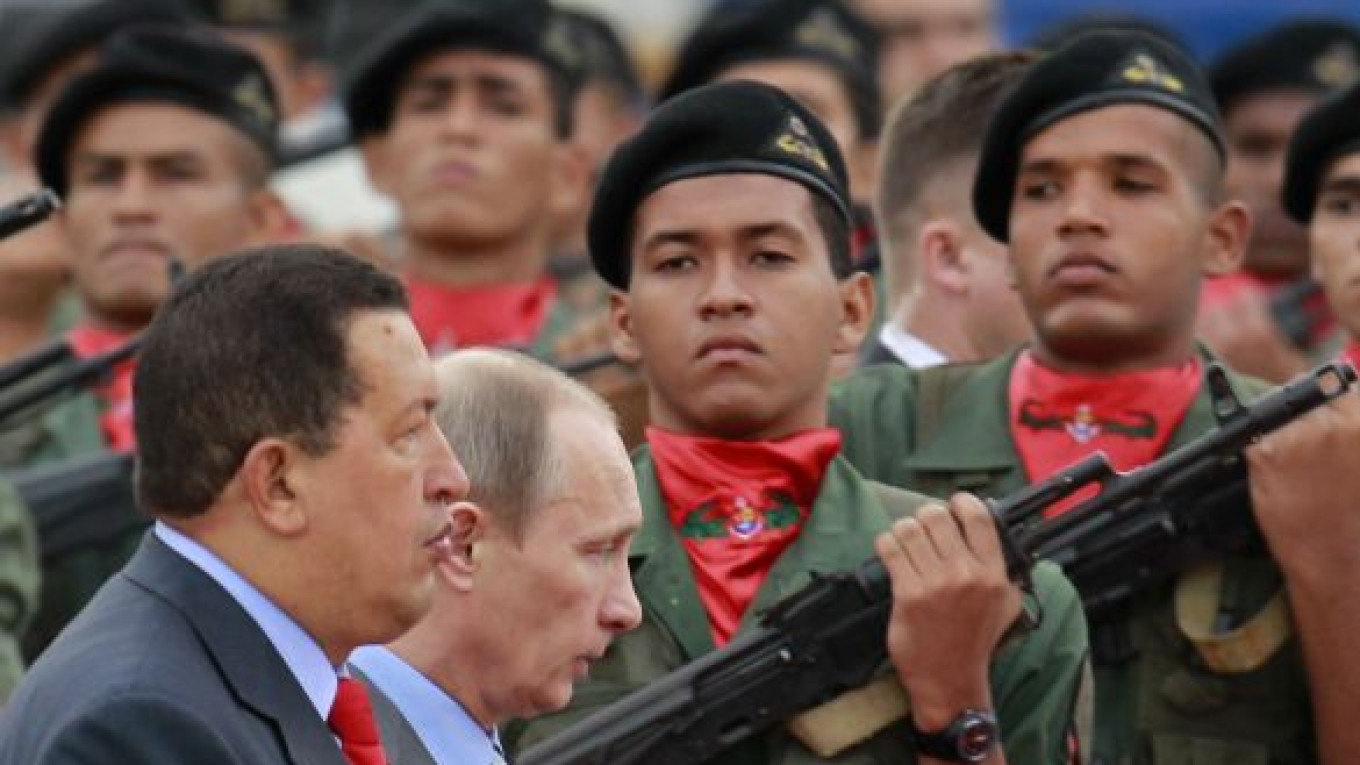Venezuela may spend more than $5 billion to buy Russian weapons, Prime Minister Vladimir Putin said Monday, signaling that the country is a larger market than Russia had expected.
Putin, who met Venezuelan President Hugo Chavez on Friday, did not say what time span the potential contracts would cover, but he implied that they were almost a done deal.
“Sources for funding have been generally determined and agreed with our partners,” he told a government meeting on the defense industry.
Venezuela’s spending on Russian weapons would include the $2.2 billion seven-year loan that Moscow promised to extend to Caracas in September, Putin said. Venezuela has not drawn from the credit line yet.
In asking for the loan, Caracas said it intended to buy several S-300 air defense systems and 92 T-72 tanks.
Putin’s announcement Monday indicated that the trade might go well beyond those previous plans, however. He did not disclose what additional supplies Venezuela was considering, although he did say the contracts would go to 13 companies, including the Izhmash plant, which is the maker of Kalashnikov assault rifles, and “one of the plants in Tula.”
Tula is home to a bevy of defense companies manufacturing weapons such as the Pantsir-S1 air defense missile and gun system, also known by its NATO name, the SA-22 Greyhound.
U.S. Secretary of State Hillary Clinton expressed concern last year that Venezuela’s purchases of Russian weapons could set off an arms race across Latin America, where tensions are high between Venezuela and U.S. ally Colombia. Chavez, a regular critic of what he calls U.S. imperialism in the region, has said his country needs to boost its defensive capacity.
Venezuela has already bought $4.4 billion worth of arms from Russia since 2005, including Sukhoi fighter jets and Kalashnikov assault rifles.
“Questions that the strengthening of the defensive capacity of small states may be a threat to someone, I think, are inaccurate,” Putin said in Caracas. “If the United States doesn’t want to supply weapons to other countries, such as Venezuela, it’s good for us. Let them go on with this. ‘Nature abhors a vacuum’ is what we say in Russia.”
Caracas had no immediate response to Putin’s comments.
At the government meeting Monday, Putin said the defense industry produced 13 percent more weapons last year than the year before. But he criticized the sector for discarding 40 percent of its research and development because of poor coordination with the Defense Ministry requirements.
“The money and specialist labor get spent only for the results to end up in storage,” he said.
Russian arms exports posted much more modest growth in 2009, rising to $8.8 billion, from $8.35 billion a year earlier, said Alexander Fomin, deputy director of the Federal Service for Defense Cooperation. Foreign sales will grow to $9 billion this year, he has said.
Russia booked $15 billion worth of new defense orders from foreign customers last year, including a deal to build six diesel submarines for Vietnam, which experts valued at $4 billion. The country now has defense contracts worth $40 billion to fulfill.
Russia’s other main arms customers include India, China and Algeria.
A Message from The Moscow Times:
Dear readers,
We are facing unprecedented challenges. Russia's Prosecutor General's Office has designated The Moscow Times as an "undesirable" organization, criminalizing our work and putting our staff at risk of prosecution. This follows our earlier unjust labeling as a "foreign agent."
These actions are direct attempts to silence independent journalism in Russia. The authorities claim our work "discredits the decisions of the Russian leadership." We see things differently: we strive to provide accurate, unbiased reporting on Russia.
We, the journalists of The Moscow Times, refuse to be silenced. But to continue our work, we need your help.
Your support, no matter how small, makes a world of difference. If you can, please support us monthly starting from just $2. It's quick to set up, and every contribution makes a significant impact.
By supporting The Moscow Times, you're defending open, independent journalism in the face of repression. Thank you for standing with us.
Remind me later.


